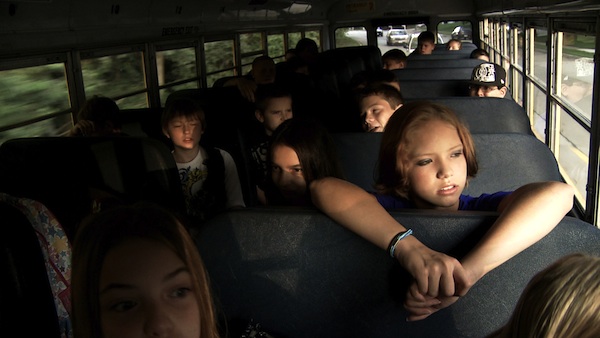Arts & Entertainment
Showdown over an ‘R’ rating
New documentary on bullying leads lesbian teen on a mission

Katy Butler, 17, launched a Change.org petition to change the rating for the upcoming documentary “Bully” and was in D.C. last week to bring attention to her cause.
“When I saw this new movie was coming out, I thought it was so awesome, because it was about bullying and had such a great message, and then I saw that it was rated ‘R’ … it’s missing the entire target audience of the film, which is the middle and high school students,” Butler says about why she started the petition.
Filmed over the 2009-10 school year, “Bully,” directed by Lee Hirsch, follows three students who have been bullied, including one who brought a gun to school and is now in juvenile detention awaiting the outcome of her case, and two sets of parents whose sons committed suicide after being bullied.
The film’s website, thebullyproject.com, states that more than 13 million American kids will be bullied this year and three million students are absent each month because they do not feel safe in school. A disproportionate number of them are LGBT.
According to filmratings.com, a website the Motion Picture Association of America links to, “Bully” received an ‘R’ rating for “some language.” The word “fuck” is used multiple times in the film.
According to the MPAA’s classification and rating rules effective, Jan. 1, 2010, “a motion picture’s single use of one of the harsher sexually derived words … initially requires at least a PG-13 rating. More than one such expletive requires an R rating, as must even one of those words used in a sexual context.”
One of the complaints about the rating is the difficulty pre-teens and most teenagers will have in seeing the film. While an R rating does not keep them from seeing the movie altogether, it does restrict when they can see it, since they will need a parent with them.
It is also more difficult to get schools to show R-rated films, as it requires permission slips to be signed in many school districts.
“The R rating is not a judgment on the value of any movie. The rating simply conveys to parents that a film has elements strong enough to require careful consideration before allowing their children to view it,” Joan Graves, chairman of the classification and rating administration, said in a statement released after receiving the petition.
Butler, who came out as a lesbian in middle school, has been the victim of bullying herself.
“My school didn’t really like that, they called me names … pushed me into lockers and into walls, they ended up slamming my hand into my locker and breaking my finger,” Butler says.
Some have asked why the filmmakers don’t just remove the scenes with the expletives, or censor just the word, since many say if the word was used more sparingly, the film would have received a PG-13 rating, but Butler doesn’t think that would help matters.
“They can’t take out the word, it won’t have the same message. It won’t have the same effect on the kids, parents and teachers who see this movie,” Butler says. “Those are the words that kids used everyday in school to bully each other … no one goes into schools and takes out those words.”
The MPAA also hosted a screening with D.C.-area principals and educators on March 15. The screening was followed by a panel discussion on the challenges educators face in dealing with bullying and how to best ensure that students feel safe when they are in school.
MPAA Chairman Chris Dodd (a former U.S. senator), “Bully” distributor Harvey Weinstein, “Bully” director Lee Hirsch, D.C. Public Schools Chancellor Kaya Henderson and Joseph Wright, senior vice president and head of the Child Health Advocacy Institute at Children’s National Medical Center in Washington, were on the panel.
As of Tuesday afternoon, Butler’s petition had garnered about 439,000 signatures.
Graves’s statement said that the MPAA shares Butler’s goal of highlighting the problems with bullying.
“Katy Butler’s efforts in bringing the issue of bullying to the forefront of a national discussion in the context of this new film are commendable and we welcome the feedback about this movie’s rating,” Graves said in the statement. “We hope that her efforts will fuel more discussion among educators, parents and children.”
Butler has met with the head of the ratings board, when she hand delivered the signed petitions.

Katy Butler was in Washington last week to encourage the MPAA to reconsider its R rating for the new documentary ‘Bully.’ (Blade photo by Michael Key)
Butler’s efforts to change the rating have been noticed by many, including Ellen DeGeneres, who had Butler on her talk show and has asked her viewers to follow her lead and sign the petition.
“Ellen is wonderful, she is one of my roles models,” Butler says of the comedian. “I definitely couldn’t be doing what I’m doing right now without her.”
DeGeneres is not the only celebrity to push for the MPAA to change the rating. New Orleans Saints quarterback Drew Brees has Tweeted for his followers to sign the petition. A bipartisan group of 26 members of Congress has thrown its support behind the petition.
Younger celebrities, such as Justin Beiber and Demi Lovato, have also been pushing for people to sign the petition, Tweeting about it to their many followers.
“I think [Bieber and Lovato] especially are hitting the preteen, middle school age group because those are their fans,” Butler says. “If your role model is supporting something as important as bullying, then a lot of the time, these kids are going to look at it too.”
Butler will receive a special award, presented by Harvey Weinstein, whose production company is releasing the film, at GLAAD’s 23rd annual Media Awards in New York City on Saturday.
“The MPAA made a mistake in restricting this film to adult audiences. Everyone — young and old alike — needs to see this film and the devastating impact that bullying can have on today’s young people,” says GLAAD spokesperson Herndon Graddick. “Katy has bravely used her voice to take a stand and has inspired countless Americans, including so many members of Congress and public figures, to show their support for the safety of all our children.”
All the advocacy toward changing “Bully’s” rating is just the beginning for this high school junior. Butler plans on studying political activism once she finishes high school. She would like to attend the University of Michigan or a school in the D.C., New York or Chicago areas.
“Bully” opens in theaters in New York and Los Angeles on March 30 and D.C. and other cities on April 13.
Sports
Bisexual former umpire sues Major League Baseball for sexual harassment
Brandon Cooper claims female colleague sexually harassed him

A fired former umpire is suing Major League Baseball, claiming he was sexually harassed by a female umpire and discriminated against because of his gender and his sexual orientation.
Brandon Cooper worked in the minor league Arizona Complex League last year, and according to the lawsuit he filed Wednesday in federal court in Manhattan, he identifies as bisexual.
“I wanted my umpiring and ability to speak for itself and not to be labeled as ‘Brandon Cooper the bisexual umpire,’” he told Outsports. “I didn’t want to be labeled as something. It has been a passion of mine to simply make it to the Major Leagues.”
But that didn’t happen. Instead of being promoted, he was fired. His suit names MLB and an affiliated entity, PDL Blue, Inc., and alleges he had endured a hostile work environment and wrongful termination and/or retaliation because of gender and sexual orientation under New York State and New York City law.
“Historically the MLB has had a homogenous roster of umpires working in both the minor and major leagues,” Cooper claims in his suit. “Specifically, to date there has never been a woman who has worked in a (regular) season game played in the majors, and most umpires are still Caucasian men. To try to fix its gender and racial diversity issue, defendants have implemented an illegal diversity quota requiring that women be promoted regardless of merit.”
Cooper claims former umpire Ed Rapuano, now an umpire evaluator, and Darren Spagnardi, an umpire development supervisor, told him in January 2023 that MLB had a hiring quota, requiring that at least two women be among 10 new hires.
According to the suit, Cooper was assigned to spring training last year and was notified by the senior manager of umpire administration, Dusty Dellinger, that even though he received a high rating in June from former big league umpire Jim Reynolds, now an umpire supervisor, that women and minority candidates had to be hired first.
Cooper claims that upon learning Cooper was bisexual, fellow umpire Gina Quartararo insulted him and fellow umpire Kevin Bruno by using homophobic slurs and crude remarks. At that time, Quartararo and Cooper worked on the same umpiring crew and being evaluated for possible promotion to the big leagues.
This season, Quartararo is working as an umpire in the Florida State League, one of nine women who are working as minor league umpires.
Cooper said he notified Dellinger, but instead of taking action against Quartararo, he said MLB ordered Cooper to undergo sensitivity training. According to his lawsuit, he was also accused of violating the minor league anti-discrimination and harassment policy.
Cooper’s suit says he met with MLB Senior Vice President of Diversity, Equity and Inclusion Billy Bean — who the Los Angeles Blade reported in December is battling cancer.
The lawsuit says at that meeting, Bean told the umpire that Quartararo claimed she was the victim, as the only female umpire in the ACL. Cooper said he told Bean Quartararo regularly used homophobic slurs and at one point physically shoved him. He also claims that he has video evidence, texts and emails to prove his claim.
But he said his complaints to Major League Baseball officials were ignored. His lawsuit said MLB passed him over for the playoffs and fired him in October. He said of the 26 umpires hired with Cooper, he was the only one let go.
Through a spokesperson, MLB declined to comment on pending litigation. Quartararo has also not publicly commented on the lawsuit.
a&e features
Eastern Shore chef named James Beard Finalist
Harley Peet creates inventive food in an inclusive space

In a small Eastern Shore town filled with boutiques, galleries, and the occasional cry of waterfowl from the Chesapeake, Chef Harley Peet is most at home. In his Viennese-inflected, Maryland-sourced fine-dining destination Bas Rouge, Peet draws from his Northern Michigan upbringing, Culinary Institute of America education, and identity as a gay man, for inspiration.
And recently, Peet was named a James Beard Finalist for Best Chef: Mid-Atlantic – the first “Best Chef: Mid-Atlantic” finalist representing the Eastern Shore.
Peet, after graduation from the Culinary Institute of America, took a position as sous chef at Tilghman Island Inn, not far from Bas Rouge. Falling in love with the Eastern Shore, he continued his passion for racing sailboats, boating, gardening, and fishing, and living his somewhat pastoral life as he opened Bas Rouge in 2016 as head chef, a restaurant part of the Bluepoint Hospitality group, which runs more than a dozen concepts in and around Easton, Md.
Coming from a rural area and being gay, Peet knew he had his work cut out for him. He was always aware that the service and hospitality industry “can be down and dirty and rough.”
Now as a leader in the kitchen, he aims to “set a good example, and treat people how I want to be treated. I also want to make sure if you’re at our establishment, I’m the first to stand up and say something.”
The Bas Rouge cuisine, he says, is Contemporary European. “I’m inspired by old-world techniques of countries like Austria, Germany, and France, but I love putting a new spin on classic dishes and finding innovative ways to incorporate the bounty of local Chesapeake ingredients.”
His proudest dish: the humble-yet-elevated Wiener Schnitzel. “It is authentic to what one would expect to find in Vienna, down to the Lingonberries.” From his in-house bakery, Peet dries and grinds the housemade Kaiser-Semmel bread to use as the breadcrumbs.
Peet works to support the LGBTQ community inside and outside of the kitchen. “I love that our Bluepoint Hospitality team has created welcoming spaces where our patrons feel comfortable dining at each of our establishments. Our staff have a genuine respect for one another and work together free of judgment.”
Representing Bluepoint, Peet has participated in events like Chefs for Equality with the Human Rights Campaign, advocating for LGBTQ rights.
At Bas Rouge, Peet brings together his passion for inclusion steeped in a sustainability ethic. He sees environmental stewardship as a way of life. Peet and his husband have lived and worked on their own organic farm for several years. Through research in Europe, he learned about international marine sourcing. Witnessing the impacts of overfishing, Peet considers his own role in promoting eco-friendly practices at Bas Rouge. To that end, he ensures responsible sourcing commitments through his purveyors, relationships that have helped create significant change in how people dine in Easton.
“I have built great relationships in the community and there’s nothing better than one of our long-standing purveyors stopping in with a cooler of fresh fish from the Chesapeake Bay. This goes especially for catching and plating the invasive blue catfish species, which helps control the species’ threat to the local ecosystem.
Through his kitchen exploits, Peet expressed a unique connection to another gay icon in a rural fine-dining restaurant: Patrick O’Connell, of three Michelin starred Inn at Little Washington. In fact, Peet’s husband helped design some of O’Connell’s kitchen spaces. They’ve both been able to navigate treacherous restaurant-industry waters, and have come out triumphant and celebrated. Of O’Connell, Peet says that he “sees [his restaurants] as canvas, all artistry, he sees this as every night is a show.” But at the same time, his “judgment-free space makes him a role model.”
Being in Easton itself is not without challenges. Sourcing is a challenge, having to either fly or ship in ingredients, whereas urban restaurants have the benefit of trucking, he says. The small town “is romantic and charming,” but logistics are difficult – one of the reasons that Peet ensures his team is diverse, building in different viewpoints, and also “making things a hell of a lot more fun.”
Reflecting on challenges and finding (and creating) space on the Eastern Shore, Peet confirmed how important it was to surround himself with people who set a good example, and “if you don’t like the way something is going … move on.”

Team DC, the umbrella organization for LGBTQ-friendly sports teams and leagues in the D.C. area, held its annual Night of Champions Awards Gala on Saturday, April 20 at the Hilton National Mall. The organization gave out scholarships to area LGBTQ student athletes as well as awards to the Different Drummers, Kelly Laczko of Duplex Diner, Stacy Smith of the Edmund Burke School, Bryan Frank of Triout, JC Adams of DCG Basketball and the DC Gay Flag Football League.
(Washington Blade photos by Michael Key)



















-

 State Department3 days ago
State Department3 days agoState Department releases annual human rights report
-

 Maryland4 days ago
Maryland4 days agoJoe Vogel campaign holds ‘Big Gay Canvass Kickoff’
-

 Politics3 days ago
Politics3 days agoSmithsonian staff concerned about future of LGBTQ programming amid GOP scrutiny
-

 District of Columbia18 hours ago
District of Columbia18 hours agoCatching up with the asexuals and aromantics of D.C.












